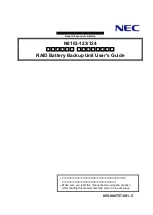
5
CHARGE PROCESS
See A on page 2. The figure shows the charge process in a graph with Voltage (V) and Current (I) over time (t)
The charge status is shown by the LED display. See E on page 3.
PREANALYSIS
The charger checks if the battery is correctly connected.
The battery’s charge level (V) is measured.
CHARGING (Pressing only the power button)
The charger starts charging the battery with 50A until the voltage level reaches 14.4V. The charge voltage is then held constant at 14.4V and the charging
current is reduced until it is below a defined level. The charge voltage then drops to 13.6V, before the long-term charging phase starts. During charging,
battery charge is shown by the number of LEDs illuminated. The blinking segment above these LEDs indicates active charging. Once full battery charge
is reached, all 5 LED segments remain illuminated. If the measured battery voltage is below 2.0V, the charger will enter Error Mode, and the warning
triangle above the battery indication will start to flash.
14,7 BUTTON
Some batteries require a higher charging voltage than other batteries. If the 14.7V button is pressed the button will be illuminated and the maximum
charging voltage will be 0.3V higher than the standard level. Always follow the battery manufacturers recommendation regarding charging voltage.
LI BUTTON
Pushing this button will activate the charging curve for Li-Ion batteries. The button will be illuminated when this mode is selected. The top charge voltage
is 14,4V and float charge voltage is 13,5V. The maximum time in step 3 is set to 30minutes. In this mode the charger output will be activated even if a
battery is not connected.
POST ANALYSIS
The charger analyses the battery again after the charging phase. Post analysis can detect batteries with a short circuit in individual cells. This cannot be
detected in the pre analysis. If the battery voltage drops below 12V within 2min, the charger will go into error mode and the red warning triangle will start
to flash. The charging sequence will be stopped.
MAINTENANCE CHARGING
After the battery is fully charged, the charger will deliver 13,6V with a maximum of 50A. This is indicated by all battery LEDs slowly pulsating.
POWER SUPPLY MODE
When the charger is turned off, the power button can be pressed for 5 seconds until the LEDs shine one by one in a regular bottom to the top cycle. The
charger will be in power supply mode regardless of the battery voltage, so it can be used to replace the battery of the car without loosing car settings or
data. In this mode, the charger supply 13.7V and max 50 Amp. If the output short circuit in this mode, the charger will go into error mode. You should
press the power button to turn off the charger, correct the problem, then restart the charger (go to charger or power supply mode).
MAINTENANCE
Make sure that the connectors on both charger and cables are free from moist and dirt before using the charger. See B page 2 and C page 3. All batteries
should be inspected monthly as a minimum to achieve the best possible safety. The charging process is in such way that the batteries remain fully charged
without further water consumption than normal evaporation.
If future needs require a software update of the charger, it can be done through the micro-USB port at the end of the charger.
See D page 3. Necessary information will be given along with the software.
WARRANTY
The guarantee applies to faults in production and materials for 2 years from date of purchase. The customer must deliver the product back to the place
of purchase together with the receipt. The guarantee shall cease to apply if the charger is handled negligently, opened or repaired by someone other than
DEFA or an authorized representative of DEFA. DEFA has no other guarantee than this and will not be responsible for other costs than those referred to, i.e.
no possible additional costs. Neither is DEFA bound by any other guarantee.
GB






































